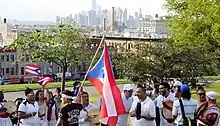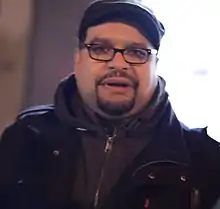El Grito de Sunset Park
El Grito de Sunset Park is a Puerto Rican activist organization in Brooklyn[1][2] that has been described as a police watchdog.[3]
 El Grito de Sunset Park gathering in 2016 | |
| Formation | c. 2002 |
|---|---|
| Type | 501(c)(3) organization |
| Location | |
| Website | www |
History

One of the founders of El Grito de Sunset Park is Dennis Flores, a "cop watcher" who began documenting the activities of the New York Police Department in 1995.[2][4][5] He has been arrested more than 70 times for his activities.[4] Flores and others founded El Grito de Sunset Park in 2002, before filming police activities was common.[5] According to Flores, the organization was founded with a $270,000 settlement he received after the police attacked him in 2002.[6] The group became a 501(c)(3) organization in 2015.[7]
The organization has roots in the primarily Puerto Rican neighborhood of Sunset Park in Brooklyn. The name "El Grito" means "the cry" or "the call" in Spanish, and is a reference to the independence movements El Grito de Lares in Puerto Rico and El Grito de Dolores in Mexico.[8] El Grito de Sunset Park has ties to the Young Lords, a Puerto Rican radical group.[1] The group's founders were influenced by social movements in Latin America; Flores witnessed organizing efforts in the Mexican city of Oaxaca in 2006 and 2007, while Jason Del Aguila, also a cofounder, worked for some time in Guatemala and El Salvador.[9]
Activities
El Grito de Sunset Park's activities include organizing an art festival; advocating against gentrification; and photographing police activities.[8] When it began, the organization would film police responses to the Puerto Rican Day Parade, which were sometimes violent. Eventually, the group began to film all year.[5] In 2012, the group supported a rent strike in Sunset Park. Hispanic music and spoken word poetry are commemorated in videos made by El Grito de Sunset Park.[10] In 2015, the group began organizing its own Puerto Rican Day Parade and Festival.[11] It worked to gather and send supplies to Puerto Rico in the aftermath of Hurricane Maria in 2017.[8] In 2014, one of the group's videos played a role in charges against a teenage resident of Sunset Park getting dropped,[12] while in 2015 another helped get charges dropped against a Mexican street vendor accused of attacking a policeman.[5]
References
- Robé 2020, p. 67.
- Kofman, Ava (September 21, 2017). "Taser wants to build an army of smartphone informants". The Intercept. Retrieved June 11, 2020.
- Trujillo, Josmar (March 17, 2016). "A Week of Crackdowns on Activists and Copwatchers in NYC". The Huffington Post. Retrieved June 11, 2020.
- Nevett, Joshua (June 10, 2020). "George Floyd: The personal cost of filming police brutality". BBC. Retrieved June 11, 2020.
- Surico, John (August 21, 2015). "On Patrol with the Copwatchers Who Film the NYPD". Vice. Retrieved June 11, 2020.
- Robé 2020, p. 69.
- Robé 2020, p. 70.
- Guzmán Valerio, Luis (2019). "Community organizing in Sunset Park on the eve of the 2016 election". Latino Studies. 17 (3): 382–388. doi:10.1057/s41276-019-00187-x. S2CID 200031258.
- Robé 2020, p. 68.
- Robé 2020, p. 71.
- Robé 2020, p. 85.
- Robé 2020, pp. 80–82.
Sources
- Robé, Christopher (Winter 2020). "El Grito de Sunset Park: Cop Watching, Community Organizing, and Video Activism". Journal of Cinema and Media Studies. 59 (2): 62–87. doi:10.1353/cj.2020.0003. S2CID 214194508.